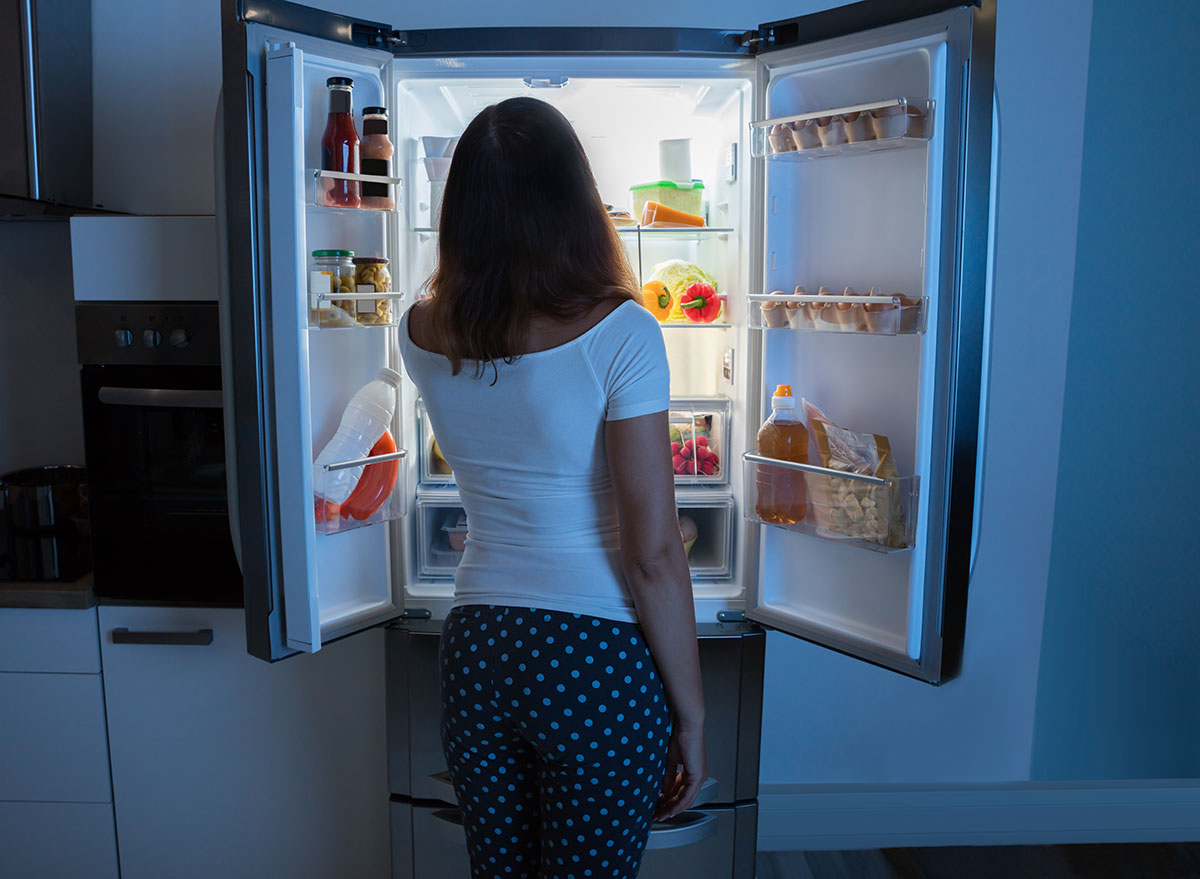The #1 Best Food to Eat Before Bedtime, Say Dietitians

There is a common misconception that eating too close to bedtime will lead to weight gain. While nighttime eating is one habit that may contribute to extra pounds, especially when it contributes to overconsuming calories for the day, eating certain foods before bed may actually provide some benefits.
If you are looking for a post-dinner snack before you hit the sack, protein is your best bet. Luckily, protein comes and all shapes and sizes.
From plant to animal sources, and tough textures to liquid, here's why protein is the best food to eat before bed. Read on, and for more on how to eat healthy, don't miss 7 Healthiest Foods to Eat Right Now.
Protein helps restore and build muscle mass.

One of the benefits of consuming protein before bed is its role in tissue repair. Your body is constantly using the protein you consume throughout the day to repair, rebuild and create tissue within your body. However, when you fast overnight, there are fewer protein "building blocks" for these functions.
Consuming protein before bed provides a dose of amino acids, the building blocks of protein, to be used for tissue maintenance overnight. Having this extra nighttime protein is especially helpful for someone who is trying to build muscle tissue or gain weight.
Additionally, while you sleep, your body naturally increases its production of growth hormone, aiding in the repair of tissues. Having those amino acids from protein available allows you to take full advantage of this natural spike in growth hormone.
Protein helps boost your metabolism (temporarily).

One of the other benefits of consuming protein before bed is that it has a high thermic effect.
This refers to the natural increase in calorie burn that occurs after eating to account for the energy required to digest, metabolize and absorb food.
While all macronutrients, carb, fat, and protein, provide some amount of thermic effect, protein provides the highest amount. Meaning, after eating protein-rich food, you will burn more calories than if you had equivalent amounts of carbohydrate- or fat-based foods.
In efforts to make the most of the calories you consume before bed, protein provides more benefits than consuming carbohydrates or fat.
Protein can improve your sleep quality.

Certain sources of protein, like turkey, fatty fish, and certain nuts may even be able to help improve your sleep quality. For example, turkey and almonds contain an amino acid called tryptophan. This nutrient aids in the production of melatonin which may promote tiredness and aid in overall sleep quality.
Fatty fish and walnuts are other protein sources that may aid in sleep as well as both foods contain omega-3 fatty acids. This heart-healthy form of fat has been shown to increase the production of serotonin, a hormone that promotes a feeling of well-being and is also thought to aid in sleep. One study published in the journal Nutrients found a direct link between consuming omega-3 polyunsaturated fats before bed and improved sleep efficiency as well as falling asleep faster.
Lastly, walnuts naturally contain melatonin, and, when eaten, can increase blood concentration of this hormone that plays a major role in your sleep-wake cycle.
The best sources of protein before bed.

Protein can be found in a wide variety of foods, so there are plenty of options to choose from when trying to incorporate this nutrient before bed.
Lean meat, poultry, fish, eggs, low-fat dairy, and soy products are all great options when looking for concentrated sources of protein. You can have a few bites of leftover meat from dinner, enjoy a hardboiled egg, top some Greek yogurt with walnuts, a glass of milk, or make a protein shake as different ways to enjoy nighttime protein.
All of these options are perfectly acceptable, just keep in mind that you should focus on protein and keep the carbs and fat to a minimum. Consuming a snack dense in all three macronutrients will likely be calorie-dense and could contribute to excess calories and weight gain.
Takeaway

As you can see, eating before bed does have its perks when consuming the correct foods. Not all calories are created equally, and it is important to be intentional about your food choices before laying down.
While eating protein may have its benefits, make sure to keep portions reasonable as there is such thing as having too much of a good thing, and too much food volume from any nutrient may actually negatively impact sleep. Small, snack-size portions and easy-to-digest options, like liquids, are ideal ways to incorporate protein before bed.
For more healthy eating news, make sure to sign up for our newsletter!
Read this next:








